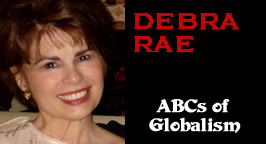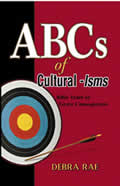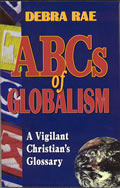CAPITALISM, COMMUNISM, OR COMMONISM: WORLDVIEWS IN CRISIS
By
Debra Rae
July 3, 2010
NewsWithViews.com
In his 1964 book, No Apologies, the late U.S. Senator Barry Goldwater characterized the Trilateral Commission as a “skillful, coordinated effort to seize control and consolidate the four centers of power—political, monetary, intellectual, and ecclesiastical.” The end result is global governance, core values for which are socialist at best, Marxist at worst.
By way of introduction, any personally-held worldview—whether biblical, secular, cosmic, or Marxist—is a broad, though targeted system of thought as to how one perceives the world and his place in it. While a self-serving worldview seeks to feather one’s own nest, a principled worldview is guided by some developed belief system that works for good and more often than not acknowledges God.
Monetary Center of Power
It’s been said that “money alone sets all the world in motion (Publilius Syrus, ~100 BC, Maxims). How one views it determines the fate of households, nations, and the global community. For a Marxist, secular humanist, or cosmic humanist, the primary source is man-inspired manifestos. Depending on one’s orientation, biblical or otherwise, his economic policies vary greatly.
Understandably, opposing worldviews inflame ire when they clash; however, upon merging, the resulting mutation appeals to a larger segment of society. For example, internationalists opportunistically combine principles of super-capitalism with communism to affect a one-world economic system perceived to be kinder and gentler than either parent, but wrongly so.
Unfortunately, “none are more hopelessly enslaved than those who falsely believe they are free” (Goethe). Here’s the problem: A socialist believes that the way to achieve good things is to have government do it, but a government expected to provide everything one needs is able to take away everything he has.
For the power hungry, it’s not so much money, but the inordinate love of money that the Bible fingers as “the root of all evil.”[1] The biblical phrase “filthy lucre”[2] punctuates unprincipled courtship of money and power, described in secular terms by Professor Carroll Quigley.[3] In 1966, the professor fingered a far reaching aim of financial super-capitalism that is “to create a world system of financial control in private hands able to dominate the political system of each country and the economy of the world as a whole.”
Birth of Commonism
When global super-capitalism is mated with communism, the result is a world socialist government called “commonism.” By transforming private intellectual assets and nationally-controlled natural resources into the global commons, commonism effectively weds the bourgeoisie and the working proletariat—allegedly, for the greater good.
To commonists, “greedy” Americans are a cancer whose market-directed economies wreak chaos and instability. In their view, for the sake of “social justice,” producers must provide for non-producers—from each according to ability, to each according to his work and/or need.
With this mindset, commonists advance a sort of secular version of the kingdom of God. In so doing, they fashion their own tower of Babel.[4] Having personally scaled its counterpart in Iraq (a spiral minaret), I possess first-hand knowledge of the sun-baked brick residue of man’s impertinence before the living God; and I assure you it’s not the utopian dream imagined.
Granted, were there no greed, jealousy, or laziness, commonism could possibly bring about a more productive society; but all three exist. Nonetheless, in its race to obliterate power-without-controls over giant corporations, socialists overlook that commonism itself is but a steppingstone for bureaucratic burdens and regulations, coupled with invasion of privacy and wealth confiscation. So much for freedom and productivity.
Guiding Principle of Sustainability
Historically, the sorry tale of socialism (commonism) is that of economic failure and crimes against humanity. Nevertheless, while touting the Marxist-Leninist maxim of “earning one’s keep on the planet,” internationalists rethink, redesign, and rebuild preeminent worldviews to create a values framework aimed at ensuring global sustainability and strengthening socio-economic welfare.
In reality, “sustainable development” isn’t about conservationism and stewardship. Its true agenda first gained preeminence at the Rio Earth Summit (1972), called the UN Conference on Environment and Development (UNCED). Arguably, it is more accurately viewed as a euphemism for “totalitarianism.” In short, it’s a green code word for shutting down progress and transferring global wealth from first-world to third-world countries.
The concept is no where to be found in America’s founding documents; however, it is in the 1997 USSR Constitution (Chapter 2; Article 18). This socialist principle of centrally-planned, government-managed development serves the United Nations as its guiding principle; but isn’t all it’s cracked up to be.
By way of example, over a decade ago, France experimented with a controversial socialistic, work-share scheme in hopes of creating new jobs. However, the last couple of years, the 35-hour work week law hasn’t delivered on its promise. Today, the scheme is an admitted economic mistake.[5]
Sustainable Future
Even so, the march toward sustainable futures, strategies, and technologies hasn’t missed a beat. This July the World Future Society convenes in Boston, Massachusetts, for its annual conference. The WFS is where the political, economic, and even spiritual aspects of one-world government merge.
Concerned with “the common good” (utilitarianism), the Society continues to advance a lame agenda for equal distribution of wealth and work. Proponents demand that everyone has the right to assured income and affordable housing. Our Bill of Rights guarantees neither. It does, however, ensure right to private property, a no-no to enlightened globalists. Presumably, private ownership messes with biodiversity and, therefore, must be discouraged.
Stark Reality Inspires Altered Consciousness
In the absence of a tangible utopia, humans tend to seek an ideological one. For instance, cosmic humanists trust self-law achieved through collective consciousness (a sort of spiritual commonism) to affect universal enlightened production.[6]
New Thought guru Marianne Williamson suggests that the mind ascribes purposes for money—whether “holy,” or not so much—and simply by getting in touch with higher consciousness, one is assured higher income. A worker need only “follow his bliss” to produce whatever product or service will be best—and, therefore, in great demand—for the global community.
Universal enlightened production, called “god-money in action” (Randall Baer), is guided by one’s inner voice. Follow the Universe, and money flows because the Universe will pay you to be yourself and to do what you really love to do. The move toward a “cashless society” destines virtual money or e-cash to become the world currency of the future. Just wish it into your bank account, and—poof!—it’s yours.
The so-called Law of Attraction insists that what is like unto itself is drawn to self. Think big bucks, and big bucks come; but try that principle with positive ends of magnets. Really an illusion, the Law not only violates scientific principles, but also acts more like a placebo than an actual “fix” for want.
What Price Perceived Equity and Social Justice?
Whereas America’s traditional worldview celebrates life, liberty, the pursuit of property—and its stewardship—other Western worldviews advance instead some form of socialism, whether pragmatic (Marxism/Leninism) or spiritual (universal enlightened production).
The United Nations calls for converting the International Monetary Fund (i.e., global welfare) to a world central bank, thus providing preferential credit to developing nations. This central bank aligns with North American Free Trade Agreement goals—namely, “equity” and “social justice.” But, then, who doesn’t advocate equity and social justice? Problem is an agenda behind these touchy-feely terms, one achieved by forcibly transferring wealth to underdeveloped countries. Economic “affirmative action” fares no better than its gender-racial counterpart.
Moreover, former Senator Jesse Helms (R-NC) complained that the World Bank and International Monetary Fund lack sufficient accountability, squander U.S. funds, and impose lending programs that damage poor nations in the long term. Apparently, not all that glitters is gold!
Moreover, given central control of world markets, the economic reach of globalism maintains a stranglehold on the goose that laid the golden egg—namely, our free enterprise system. In the words of Henry Lamb, publisher of Eco-Logic, the burgeoning interdependent, one-world state will result in our taking on “the lowest common denominator that forced equity demands.”
Rightly viewed, the Preamble of the U.S. Constitution speaks to forming a more perfect union (not a “Global Village”); establishing justice (not exclusively for the world’s downtrodden); and insuring domestic tranquility (not by militarizing the police force). It provides for the common defense (not under the UN banner); promotes general welfare (not excluding the unborn and elderly); and secures blessings of liberty (not least of which include private property and religious expression).[7]
The grand experiment called America and her free enterprise aren’t the problem. Morally and ethically bereft scoundrels are.
Folly of Economic Utopianism
Clearly, the triumph of America’s economic prosperity is her free market system based on these Judeo-Christian principles: respect for rule of law, individual effort, and fair dealing. Pioneer sociologist Max Weber reminded us that the Reformation played a major role in the economic revolution that brought unprecedented affluence to America (The Protestant Ethic and the Spirit of Capitalism, 1905). But (in the words of Bob Dylan) “the times—they are a’changing.”
If America persists in esteeming too lightly her God-given material blessings, and if shady business practices go unpunished, Gorbachev will be proven right in insisting that her extraordinary privilege is not tenable over the long run.[8]
Even now, America’s unprecedented “economic revolution” is fast fading under the shadow of global socialism. Unfortunately, commonism cannot deliver utopianism any more than following one’s bliss can. Both claim to advance “the greater good,” but the track record for socialism remains dismal at best; and there’s no historical precedence for universal enlightened production.
America’s Challenge
With no national debt until the 1980s, America once boasted the largest middle class in the world. Since the 1960s, however, household debt is at its highest level as a percent of personal disposable income. Sadly, the nation’s debtors (government included) have, in essence, consumed the entire investment value of the United States!
Analysts predict that devastation resulting from collapse of America’s now bloated debt system likely will exceed that of 1929, when the U.S. was a creditor nation. Clearly, there is no way of escaping globalization. Without open borders, free commerce, and international collaboration, the entire world economy would topple.
| Subscribe to the NewsWithViews Daily News Alerts! |
That said, America’s challenge is clear: Without individual stewardship, there is no corporate accountability. Our hope as Americans is in true Reformation under guidance of a moral compass soundly embedded in biblical and natural law that, when given proper place, historically result in justice, freedom, order, and blessings.
Rightly so, “God bless America” is a heartfelt prayer, not just a political nicety.
Footnotes:
1,
1 Timothy 6:10.
2,
Titus 1:7, KJV
3,
Carroll Quigley, Tragedy and Hope (New York: The Macmillan
Company, 1966).
4,
Genesis 11:1-9
5,
France
Makes Good
6,
David A. Noebel, Understanding the Times: The Religious Worldviews of
our Day and the Search for Truth (Colorado Springs: Colorado: Summit
Ministries, 1996), 319-322.
7,
Debra Rae, ABCs
of Cultural –Isms: Bible Truth or Grave Consequences
(Enumclaw, WA: WinePress Publishing, 2003), 120
8,
From
the Wilderness Publications












 Share This Article
Share This Article






